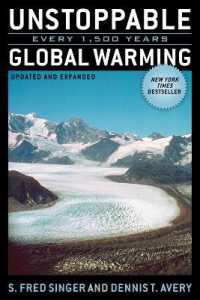Description
In recent years, resilience theory has come to occupy the core of our understanding and management of the adaptive capacity of people and places in complex social and environmental systems. Despite this, tourism scholars have been slow to adopt resilience concepts, at a time when the emergence of new frameworks and applications is pressing.
Drawing on original empirical and theoretical insights in resilience thinking, this book explores how tourism communities and economies respond to environmental changes, both fast (natural hazard disasters) and slow (incremental shifts). It explores how tourism places adapt, change, and sometimes transform (or not) in relation to their environmental context, with an awareness of intersection with societal dynamics and links to political, economic and social drivers of change. Contributions draw on empirical research conducted in a range of international settings, including indigenous communities, to explore the complexity and gradations of environmental change encounters and resilience planning responses in a range of tourism contexts.
As the first book to specifically focus on environmental change from a resilience perspective, this timely and original work makes a critical contribution to tourism studies, tourism management and environmental geography, as well as environmental sciences and development studies.
Table of Contents
Part 1: INTRODUCTION
1. Environmental change, resilience and tourism: Definitions and frameworks
Alan A. Lew and Joseph Cheer
2. Applying the adaptive capacity cycle to tourism development: An exploration of socio-social-ecological resilience
Esther Duke, Stuart Cottrell and Jana Raadik Cottrell
3. The sustainable and resilient community: A new paradigm for community development
Alan A. Lew, Chin-cheng Ni, Tsung-chiung Wu and Pin T. Ng
Part 2: NATURE-BASED TOURISM & CLIMATE CHANGE
4. Searching for resilience: Seal watching tourism as a resource for community development in Iceland
Georgette Leah Burns
5. Tourism development and resilience in small oceanic islands in Australia and Brazil
Leonardo Nogueira de Moraes
6. Ecotourism, climate change, and rural resilience in Trinidad and Tobago
Tisha Holmes
7. Cultural ecosystem services, tourism, and community resilience in coastal wetland conservation in Taiwan
Alan A. Lew and Tsung-chiung Wu
8. Managing for resilience in the face of climate change: The adaptive capacity of U.S. ski areas
Natalie Ooi
9. (Re)production of resilient tourism space in the context of climate change in coastal Québec, Canada
Dominic Lapointe and Bruno Sarrasin
10. A resilience approach to understanding collaborative coral reef conservation on Gili Trawangan, Indonesia
L. Arifin Bakti, Alan A. Lew and Yeon-Su Kim
Part 3: DISASTERS EVENTS AND TOURISM
11. Disaster resilience of small businesses in Guanxian ancient town, Sichuan, China
Honggang Xu, Fangfang Chen and Shanshan Dai
12. Death and disaster as moments of liminality: Towards collective agency and community resilience in Solukhumbu, Nepal
Maggie C. Miller
13. Tourism and the psychologically resilient city: Christchurch after the earthquake
Irina Herrschner and Phoebe Honey
14. Restoring spiritual resilience in post-disaster recovery in Fukushima
Kumi Kato
15. Fast and slow resilience in the New Zealand tourism industry
Orchiston, Caroline and Espiner, Stephen
Part 4: INDIGENOUS RESPONSES TO CHANGING ENVIRONMENTS
16. Within the changing system of Arctic tourism, what should be made resilient to what, and for whom?
Kevin Hillmer-Pegram
17. Conceptualizing destinations as a Vanua: An examination of the evolution and resilience of a Fijian social and ecological system
Apisalome Movono
Part 5: CONCLUSIONS
18. Lessons learned: Tourism and the Anthropocene
Joseph M. Cheer & Alan A. Lew








